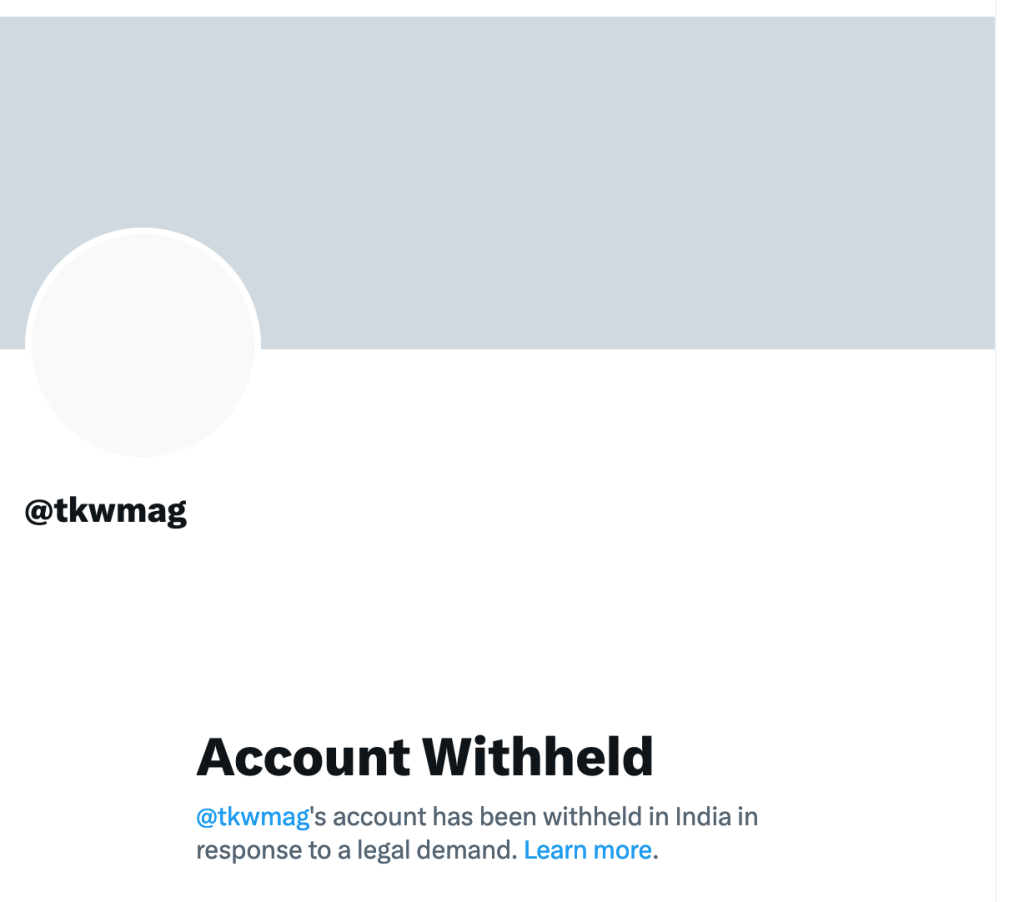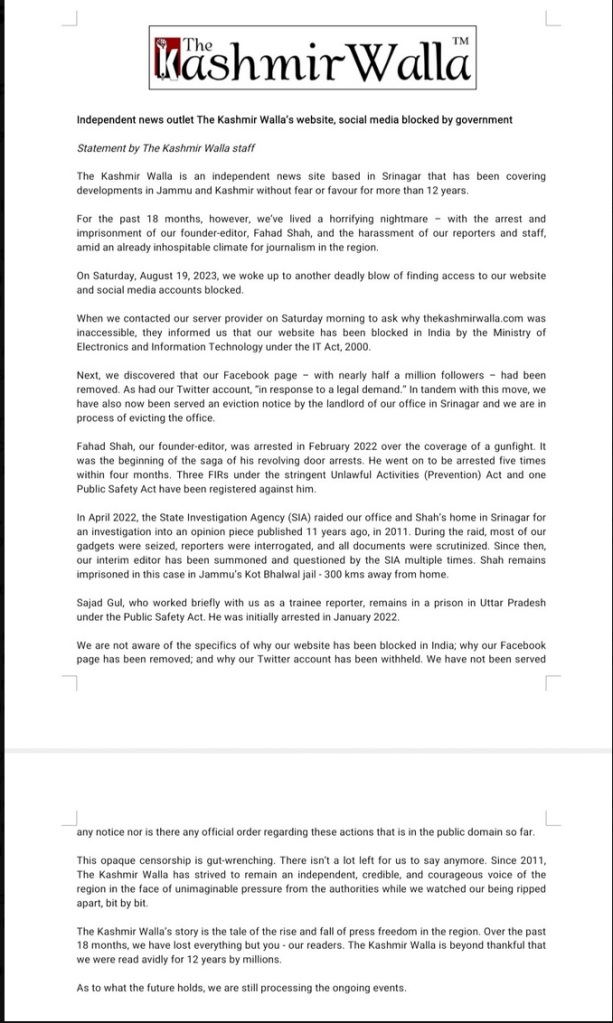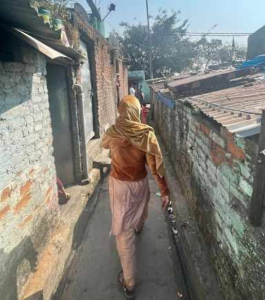Even as the bail application of Kashmir Walla editor Fahad Shah comes up before the Jammu and Kashmir High Court on August 25, the news portal’s website has been blocked and all its social media platforms have also gone blank.

In a statement, Kashmir Walla’s team of journalists said that:
On Saturday, August 19, 2023, we woke up to another deadly blow of finding access to our website and social media accounts blocked.
When we contacted our server provider on Saturday morning to ask why thekashmirwalla.com was inaccessible, they informed us that our website has been blocked in India by the Ministry of Electronics and Information Technology under the IT Act, 2000.
Next, we discovered that our Facebook page – with nearly half a million followers – had been removed. As had our Twitter account, “in response to a legal demand.” In tandem with this move, we have also now been served an eviction notice by the landlord of our office in Srinagar and we are in process of evicting the office.
The statement added that they had not been given any reason or notice why the wesbite was blocked or its social media platforms removed or withheld. The statement added:
This opaque censorship is gut-wrenching. There isn’t a lot left for us to say anymore. Since 2011, The Kashmir Walla has strived to remain an independent, credible, and courageous voice of the region in the face of unimaginable pressure from the authorities while we watched our being ripped apart, bit by bit.
Read the full statement here:

In India, websites are blocked under Sec 69A of the amended Information Technology Act, 2000 on grounds of security of state, friendly relations with foreign states, public order or prevention of incitement to offence, amongst others:
Sec 69A Power to issue directions for blocking for public access of any information through any computer resource. –
(1) Where the Central Government or any of its officer specially authorised by it in this behalf is satisfied that it is necessary or expedient so to do, in the interest of sovereignty and integrity of India, defence of India, security of the State, friendly relations with foreign States or public order or for preventing incitement to the commission of any cognizable offence relating to above, it may subject to the provisions of sub-section (2) for reasons to be recorded in writing, by order, direct any agency of the Government or intermediary to block for access by the public or cause to be blocked for access by the public any information generated, transmitted, received, stored or hosted in any computer resource.
(2) The procedure and safeguards subject to which such blocking for access by the public may be carried out, shall be such as may be prescribed.
(3) The intermediary who fails to comply with the direction issued under sub-section (1) shall be punished with an imprisonment for a term which may extend to seven years and shall also be liable to fine.
However, as “Finding 404: A Report on Website Blocking in India” by Software Freedom Law Centre pointed out , ‘Rule 16 of the Information Technology (Procedure and Safeguards for Blocking for Access of Information by Public) Rules, 2009 mandates confidentiality to be maintained with respect to all the information related to website blocking. A blanket confidentiality clause like this is unconstitutional and ultra vires section 69A of the Information Technology Act, 2000.’
The SFLC report said that the total number of websites, URLs, applications, social media posts and accounts that are blocked in India within the time period from 2015 to 2022 are 55, 607. The biggest share of website blocking is done under section 69A of the IT Act. The number of websites blocked stands at 22,447 which is 47.5 percent of the total blocked websites. Out of which 26,352 websites were blocked by MEITY and 94 were blocked by MIB.
Fahad Shah and “revolving door” arrests
Shah has been in jail for the last 18 months, charged with terrorist activities under various sections of the Unlawful Activities (Prevention) (UAPA) Act, 1967, and the Foreign Contributions Regulation Act (FCRA) in a classic revolving door arrest and bail routine. Arrested on 4 February 2022, on charges of sedition and inciting violence under the UAPA, he managed to secure bail in the UAPA cases twice, only to be re-arrested immediately in other cases.
On March 18 this year, charges were framed against Shah and Kashmir University scholar Abdul Ala Fazili in a case by the State Investigation Agency (SIA) for publishing an article authored by Fazili in 2011 entitled “”The Shackles of Slavery Will Break”. The bail application comes up for hearing before Justices Atul Shreedharan and Mohan Lal on August 25.
Shah’s arrest has drawn widespread protests from journalists’ organisations in India and abroad. More than 50 organisations issued a statement condemning the arrest but it seems to have had little impact with the government.
The media in Kashmir has all but disappeared, as Anuradha Bhasin, the executive editor of Kashmir Times said, in her book, A Dismantled State The Story of Kashmir After Article 370. The young team of journalists in The Kashmir Walla, against all odds, kept trying to publish their stories and question the official narrative. Now, one more independent space for news has been blocked.

